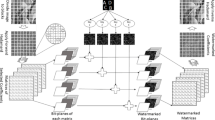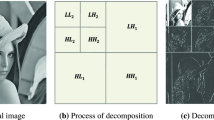Abstract
Digital hologram generated by a computer calculation is one of the most expensive contents and its usage is being expanded. Thus, it is highly necessary to protect the ownership of digital hologram. In this paper a spatial-domain and a frequency-domain electronic watermarking schemes were proposed. The spatial-domain scheme was only to compare the results to the ones from frequency-domain scheme and the frequency-domain scheme used 2-dimensional mallat-tree discrete wavelet transform. Both of them showed very high imperceptibility and quite high robustness against the attacks. Especially the MDWT-domain scheme was very high robustness such that the error ratio at the worst case was only 3%. Thus, we expect that it is used as a good watermarking scheme of digital hologram with high performance. But the spatial-domain scheme was turned out to be useless when data compression process is necessary after watermarking.
Preview
Unable to display preview. Download preview PDF.
Similar content being viewed by others
References
Ingemar, J.C., Matthew, L.M., Jeffrey, A.B.: Digital Watermarking. Morgan Kaufmann Publishers, San Francisco (2002)
Ulf, S., Werner, J.: Digital Holography. Springer, Berlin (2005)
Kishk, S., Bahram, J.: 3D Object Watermarking by a 3D Hidden Object. Optics Express 11(8), 874–888 (2003)
Hyun, K., Yeon, L.: Optimal Watermarking of Digital Hologram of 3-D object. Optics Express 13(8), 2881–2886 (2005)
Author information
Authors and Affiliations
Editor information
Editors and Affiliations
Rights and permissions
Copyright information
© 2006 Springer-Verlag Berlin Heidelberg
About this paper
Cite this paper
Choi, HJ., Seo, YH., Yoo, JS., Kim, DW. (2006). An Electronic Watermarking Technique for Digital Holograms in a DWT Domain. In: Chang, LW., Lie, WN. (eds) Advances in Image and Video Technology. PSIVT 2006. Lecture Notes in Computer Science, vol 4319. Springer, Berlin, Heidelberg. https://doi.org/10.1007/11949534_101
Download citation
DOI: https://doi.org/10.1007/11949534_101
Publisher Name: Springer, Berlin, Heidelberg
Print ISBN: 978-3-540-68297-4
Online ISBN: 978-3-540-68298-1
eBook Packages: Computer ScienceComputer Science (R0)




